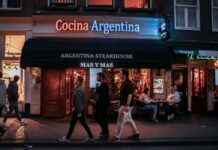Relaxed in appearance, fashionable jeans on sneakers and long messy hair, «Fico», 47, wants to be the «people’s» candidate.
All the polls place him in second position for the first round of voting, behind the left-wing senator and former guerrilla Gustavo Petro.
If no candidate wins more than 50% of the vote, a second round of voting will take place on June 19 to designate the replacement for Conservative President Ivan Duque, who cannot stand for re-election.
A father of two young children, Mr. Gutierrez is the youngest of the six presidential candidates.
Appointed at the head of the coalition of right-wing forces «Team for Colombia», the former city councilor of Medellin (2016-2019) takes great care to distance himself from the very unpopular outgoing government, but also from the traditional parties of his camp, including the «Democratic Center» (in power), from which he calls himself «independent».
– «Uribe 2.0» –
He has so far avoided appearing alongside ex-president Alvaro Uribe (2002-2010), leader of the ruling party and tutelary figure of the right, champion of a fierce fight against extreme guerrillas -left, but today discredited by legal disputes.
Unsurprisingly, Mr. Gutierrez promises firmness against the ubiquitous drug trafficking and the many armed groups that continue to operate in the country, despite the signing of a peace agreement in 2016 with the Marxist guerrillas of the Revolutionary Armed Forces of Colombia (FARC ).
His priority: «a strong state against criminal structures», he explained to AFP during the campaign. «The bandits in prison or in the grave», he launched during a trip to the turbulent border with Venezuela.
And of course, we must also block the left and the «communists».
«Fico tries to be a 2.0 version of Uribe», born in the same city, with a personality that «greets everyone by name, wants to generate empathy, show that he is there», » tricks» which had greatly contributed to the success of the ex-president, deciphers for AFP Andres Avila, political scientist at Javeriana University.
But beyond «respect for private property» and security, he fails to «make a difference» with his opponent on the left, believes this expert.
«His speech is difficult to decipher.» Like a struggling right that has not been able to modify its software, still connected to a fight against «the internal and communist enemy», which is no longer really Colombia’s problem.
Very active on social networks, «Fico» played its strategy of proximity to ordinary Colombians throughout the campaign. A campaign that would have cost him at least 38 million dollars, according to the Foundation for the freedom of the press.
Every Tuesday at 8 p.m., he puts on the costume of a television presenter and hosts a program called «Federico counts on you» on a local TV in Medellin. «Here, anyone comes, approaches, asks questions,» he tells viewers, strolling through the streets of the city, chatting with fellow citizens.
He also enjoys cycling alongside famous cyclists or jogging.
For Luz Maria Munera, opposition municipal councilor under the former mayor, he has «two personalities»: on the one hand, «he manages his image very well, the networks, wants to be seen as the nice one», but on the another «he believes that society should be obedient, almost uniform».
Despite the criticism, he finished his term with 85% approval.
In the former stronghold of Pablo Escobar, the famous drug baron killed in 1993 by the police, he has long boasted of facing the cartels head on.
But the arrest in 2017 of its Security Secretary, Gustavo Villegas, has cast doubt. The official was accused of delivering information to illegal organizations on ongoing operations and of having allied himself with a gang, heir to Escobar’s cartel.
Federico Gutierrez has always denied these accusations.














